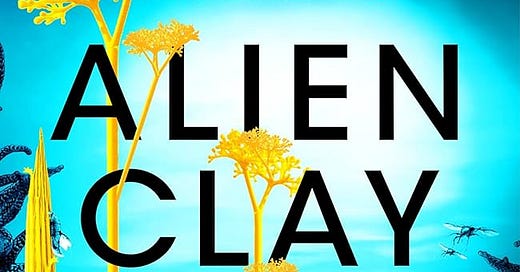Theme is hard. If it's spread too thinly, an author's work can feel vapid and flimsy. If spread too thick, it can become tiring, or even annoying, as subtext becomes text and theme turns into sermon. The middle ground of "just enough" can be a difficult target to hit, and that target can vary from one book to another. Some stories lend themselves well to thematic weight and literary merit, while others work better as pulp.
Adrian Tchaikovsky has never been the most subtle thematic writer. Even his early Shadow of the Apt books were concerned with the lines between ethics and science. But in the last decade or so, he's leaned into theme as a core pillar of his writing style. When it works, it works really well. Children of Time and the Tyrant Philosopher series are brilliant, carefully blending plot, pacing, world-building and character almost seamlessly. However, Children of Ruin and Children of Memory both made the occasional concession to plot and pacing in service to the idea and it showed. Both were still really good books don't get me wrong, but they weren't brilliant in the same way as Children of Time.
So, what does this have to do with Alien Clay? Let me put it this way: Alien Clay is the definitive Tchaikovsky book. It is the perfect encapsulation of everything Tchaikovsky has done thus far. If you haven't read Tchaikovsky, I can safely recommend this book, because at the end of it, you will at least know if you like his work. Everything else I've read (though I haven't read everything) by him is just a variant on the style present in this book. At times he's more subtle with theme, at times less, but the style is all here and perfectly summarized.
Full disclosure, I loved it. While a little blatant for some, this book has everything I love about Tchaikovsky with very little I don't. His pacing is on point, neither moving to fast or too slow. His character work is similarly well done. Professor Arten Daghdev is well realized in the first-person perspective. Though Tchaikovsky's dry humor and sense of irony remain intact, the switch from 3rd to 1st person limits how much the other characters are allowed to breathe. Don't get me wrong, they are well crafted and interesting, but outside of Daghdev, they lack the same spark as some of the characters from titles like City of Last Chances, and Children of Time. This isn't a failing per say, but it is a trade-off.
That trade-off though is probably worth on the whole. While the cast outside of Daghdev occasionally feels a little lackluster, the world of Kiln is exquisitely realized through his eyes. Wonder and dread blend together in glorious detail. The threat is real, but so is the fascination. As Daghdev grows to understand Kiln, it really felt like I was working alongside him. The biological structures which make this world tick are intriguing and plausible. That only makes the sensations they evoke more horrifying, more wondrous, and more satisfying to read. The strange symbioticism of the world is familiar enough to be understandable, but alien enough to be threatening. Over and over these differences are explored, highlighted, emphasized, and then ultimately subverted in ways that drive home the book's thematic points. It really is classic Tchaikovsky and I couldn't be happier with it.
All that said, this book won't be for everybody. As I mentioned, Tchaikovsky isn't exactly subtle with his thematic intent. Kiln and the Earth Mandate are thinly veiled philosophical arguments. Kiln, for its part, plays the familiar roll of empathy, while the Mandate is cast as doctrine. It's a familiar dialogue and long-time fans may grow tire of retreading the same piece of philosophical land. Readers familiar with Tchaikovsky may also be able to easily guess the broad strokes of how the book ends, though there are plenty of smaller twists. Honestly, I'm still not entirely sure if I find the ending unsettling, or encouraging. Both possibly, and I think both are intended readings. Empathy isn't always kind, and it always has a cost. But it will always change us.
Thank you for reading.




